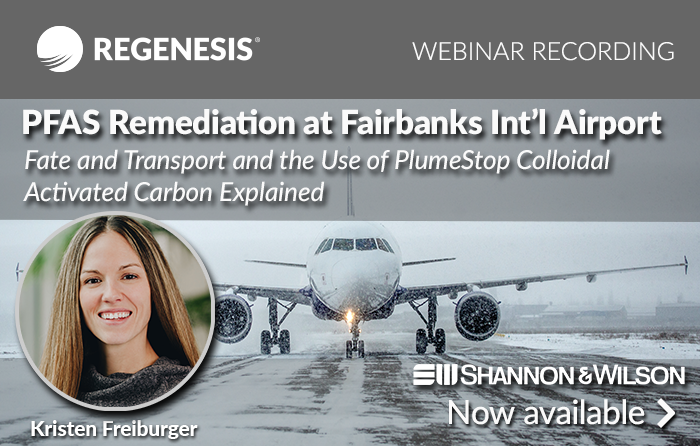In this webinar we were pleased to have as a special guest speaker Kristen Freiburger, Associate at Shannon & Wilson. Her presentation discussed PFAS remediation at Fairbanks International Airport, including a discussion of fate and transport of PFAS and the use of PlumeStop colloidal activated carbon. She was joined by Maureen Dooley, Vice President – Industrial Sector at REGENESIS, who discussed remediation solutions for petroleum hydrocarbons and PFAS at airport sites.
Highlights of this free webinar:
-
The presumed source of PFAS in groundwater in many Alaskan communities is the use of AFFF by airport rescue and firefighting at Part 139 Airports operated by Alaska DOT&PF
-
Fate and transport of PFAS as it relates to projects at Gustavus and Fairbanks Airports
-
Use of PlumeStop to address PFAS contamination at the Fairbanks International Airport
-
How PetroFix is successfully treating PHCs at airport sites
PFAS are highly soluble in water and have a very strong carbon-fluorine backbone making them resistant to traditional remediation technologies and natural attenuation. PFAS that enter groundwater are known to be persistent and travel long distances. Fate and transport of PFAS in groundwater depends on the environment which they were released and the physical properties of the PFAS being examined (e.g., carbon chain lengths, linear/branched isomers, functional groups, and degree of fluorination). The presumed source of PFAS in groundwater in many Alaskan communities is the use of AFFF by airport rescue and firefighting at Part 139 Airports operated by Alaska DOT&PF. When AFFF releases occur in areas served by private or public drinking water wells, the well water is susceptible to contamination. Kristen Freiburger will discuss the fate and transport of PFAS as it relates to her PFAS work of the Gustavus and Fairbanks Airports including the use of PlumeStop at the Fairbanks International Airport. This discussion will focus on the challenges of understanding fate and transport of PFAS.
Complete the form on this page to view this free webinar.
About the Presenters:
 Kristen Freiburger
Associate, Shannon & Wilson
Kristen Freiburger, Associate, led Shannon & Wilson in winning a 15-year contract with the State of Alaska to investigate, characterize, and remediate PFAS contamination near several Part 139 airports in Alaska. She and her team are currently assisting the State of Alaska with addressing legacy PFAS contamination originating from the international and rural airports in Anchorage, Fairbanks, Gustavus, Dillingham, King Salmon, Yakutat, Iliamna, Nome, Homer, Valdez, Cordova, and Bethel, Alaska.
Kristen’s team is also responsible for community outreach, including public meetings and communication with stakeholders, where necessary. Efforts at each airport have been adjusted to meet the unique needs of the site. Kristen is knowledgeable in federal and state compliance regulations, and has coordinated with local, state, and federal agencies on environmental issues, including high-profile written and oral communications on behalf of clients. She works with a variety of clients with different perspectives, resources, and regulatory requirements and understands the need to tailor each project site to meet the objectives of the site. Over the last 14 years she has played a central role in developing and implementing S&W’s large-scale sampling programs of private wells near a former refinery and Part 139 airports. Kristen holds a Bachelor’s of Science in Chemistry from Ball State University and a Master’s degree in Environmental Chemistry from the University of Alaska, Fairbanks.
Kristen Freiburger
Associate, Shannon & Wilson
Kristen Freiburger, Associate, led Shannon & Wilson in winning a 15-year contract with the State of Alaska to investigate, characterize, and remediate PFAS contamination near several Part 139 airports in Alaska. She and her team are currently assisting the State of Alaska with addressing legacy PFAS contamination originating from the international and rural airports in Anchorage, Fairbanks, Gustavus, Dillingham, King Salmon, Yakutat, Iliamna, Nome, Homer, Valdez, Cordova, and Bethel, Alaska.
Kristen’s team is also responsible for community outreach, including public meetings and communication with stakeholders, where necessary. Efforts at each airport have been adjusted to meet the unique needs of the site. Kristen is knowledgeable in federal and state compliance regulations, and has coordinated with local, state, and federal agencies on environmental issues, including high-profile written and oral communications on behalf of clients. She works with a variety of clients with different perspectives, resources, and regulatory requirements and understands the need to tailor each project site to meet the objectives of the site. Over the last 14 years she has played a central role in developing and implementing S&W’s large-scale sampling programs of private wells near a former refinery and Part 139 airports. Kristen holds a Bachelor’s of Science in Chemistry from Ball State University and a Master’s degree in Environmental Chemistry from the University of Alaska, Fairbanks.
 Maureen Dooley
Vice President - Industrial Sector, REGENESIS
Maureen Dooley has over twenty-five years of experience in many aspects of remediation industry, including project management, research and development, senior technical oversight, remedial design and laboratory management. Her prior experience includes the completion of numerous treatability studies designed to evaluate the biodegradation of a wide range of chemical constituents that include chlorinated solvents, petroleum hydrocarbons, explosives, aromatic hydrocarbons and pesticides. In her current role at REGENESIS, she provides technical leadership for complex soil and groundwater remediation projects, including PFAS groundwater contamination treatment, throughout North America, as well as remediation design, strategy, and business development in the northeastern United States and eastern Canada.
Maureen Dooley
Vice President - Industrial Sector, REGENESIS
Maureen Dooley has over twenty-five years of experience in many aspects of remediation industry, including project management, research and development, senior technical oversight, remedial design and laboratory management. Her prior experience includes the completion of numerous treatability studies designed to evaluate the biodegradation of a wide range of chemical constituents that include chlorinated solvents, petroleum hydrocarbons, explosives, aromatic hydrocarbons and pesticides. In her current role at REGENESIS, she provides technical leadership for complex soil and groundwater remediation projects, including PFAS groundwater contamination treatment, throughout North America, as well as remediation design, strategy, and business development in the northeastern United States and eastern Canada.

